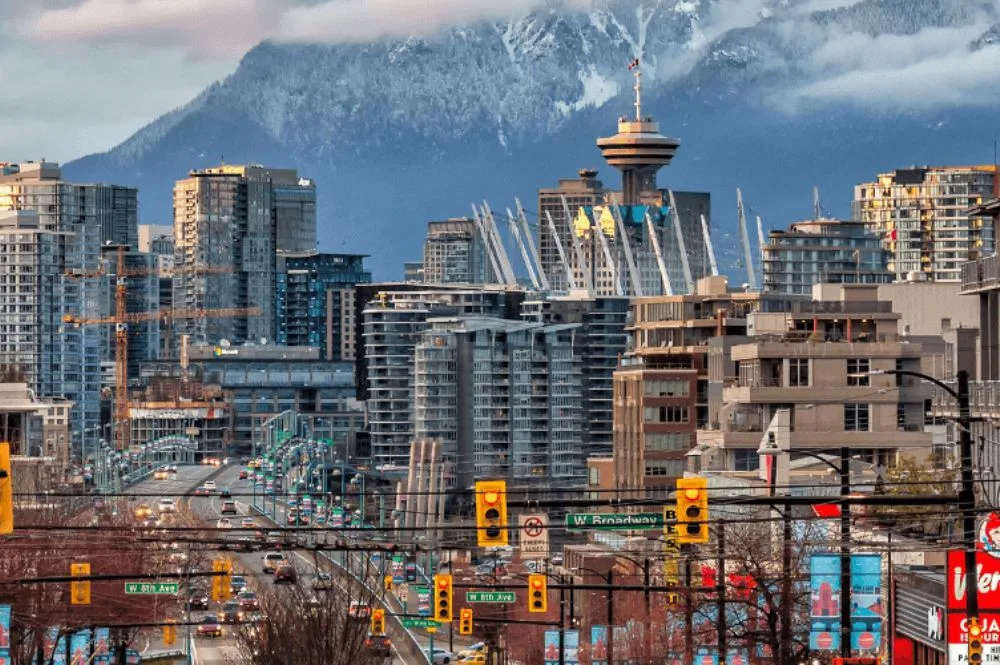So, do you need winter tires in Vancouver if it rarely snows?
Winter vs. all-season tires in Vancouver

We generally see rain in Vancouver throughout the year, with large parts of the year containing uncertain road conditions on the lower levels. The option between all-season and winter tires is primarily determined by local weather and road conditions in your region. When winter arrives, we will commonly observe snow on the peak elevations and mountain ranges of Vancouver, but more wet, rainy pavement surfaces are spread out over the lower part of the metropolis.
So, do you need winter tires in a city that almost rarely snows? What about all-season tires, which should be able to perform well in any weather? In Vancouver, the debate about whether all-season or winter tires are better is never-ending. We reviewed both winter and all-season tires to enable you to identify your best tire options for safe winter driving and hopefully, solving the debate once and for all.
WHAT ARE ALL-SEASON TIRES?
All-season tires are designed for year-round support, decent straight-line drive in a multitude of conditions, and a long tread life. All-season tires, in theory, provide versatility in a variety of driving conditions, among which include wet roads and light winter conditions.
All-Season tires, however, sacrifice some maximum summer and winter performance efficiencies to achieve this capacity. They won’t offer the same degree of extreme grip and sharp handling as a summer tire. Similarly, an All-Season tire is not designed to handle extreme winter circumstances like snowshoeing or driving on slippery ice.
All-season tires are recommended for use as temperature levels increase in temperate climates that do not see significant snowfall during the winter. They provide drivers excellent performance on gravel roads as well as paved roads in mild terrain.
WHAT ARE WINTER TIRES?
Winter tires are specifically designed to deal with cold, ice, snow, freezing rain, and slush. Their unique designs enable them to withstand these conditions effectively and optimally. Their tread patterns, for example, have been made to stay soft in cold temps for improved road gripping.
They have deeper tread depths, which improve the reduction of snow buildup and provide better traction on ice, as well as expel snow and slush from a tire’s tread for better hydroplaning resistance.
WINTER VS. ALL-SEASON TIRES: WHICH ONE IS BEST?
We began by suggesting that the best tire for you is the one that is appropriate for the weather and road conditions in which you are driving.
When Do You Need Winter Tires in BC?
In BC, motorists are required to use M+S or 3PMSF tires for winter driving from October 31st to April 30th on designated routes. Both all-season and winter tires are permitted for use during this period as per the B.C. Winter Tire Law 2023.
If you live in the Lower Mainland and Southern Vancouver, where snow and icy roads are more of a fluke than an annual ordeal, all-season tires are probably your way to go. But if you often travel outside Vancouver or live somewhere on the North Coast where snow is a frequent menace, mounting winter tires is an essential safety measure that could save your life.
All-season tires bear the M+S symbol, but they do not possess the necessary safety and performance to handle Vancouver’s rain and black ice. Winter tires are not just the safest and most secure choice but also the optimal .
SHOP FOR TIRES AT TIREWAREHOUSE.CA
Make sure your Vancouver winter or all-terrain tires match the current weather conditions in case driving is in different circumstances during the year. Tirewarehouse.ca has a huge selection of all-season and winter tires available to match your winter driving needs and budget.
Visit tirewarehouse.ca or call today for unbeatable prices on stylish winter and all-terrain tires, fast shipping, and excellent customer service.
In stock & ready to ship
Find the tires you need, delivered from a warehouse near you
